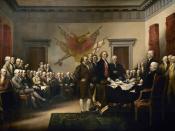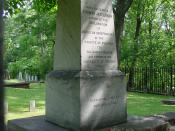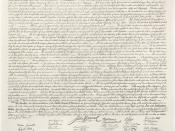In Phillis Wheatley's poem, To the Right Honorable Williamâ¦, evokes a spirit of an American vision that undermines that of Thomas Jefferson's Declaration of Independence, by reminding the Earl of Dartmouth that all should have freedom but for those who have obtained it, should not forget to thank God. Thomas Jefferson's vision of America is almost the same as Wheatley's with one major difference, his version doesn't include African Americans nor for that matter, equality for women. The words expressed, written, and agreed upon by our founding fathers, regards the vital importance to being free from Britain but ignore that the word "man" can mean mankind, human and not just white male (Arnold 2) Wheatley's version of America has a major difference with Thomas Jefferson's vision of America, she speaks for equality of African Americans and yet as she illustrates, freedom should be thanked by acknowledging God (Lauter 1243).
In 1765 when the first echoing of dispute to British authority became obvious to Parliament, the frontier in America consisted of thirteen separate colonies. Each had a resident legislature which served on provincial soil, but which served only at the pleasure of a governor appointed by the crown. By July 2, 1776, in Philadelphia, the Continental Congress adopted the resolution, introduced by Richard Henry Lee and John Adams, which actually declared independence from Great Britain. It declared, in part, ``that these United Colonies are, and of right ought to be, free and independent states, that they are absolved from all allegiance to the British Crown, and that all political connection between them and the state of Great Britain is, and ought to be, totally dissolved"/ (Arnold 4) The Declaration, which explained why the Colonies that were now states declare their independence, after which was adopted by the Continental Congress July...


